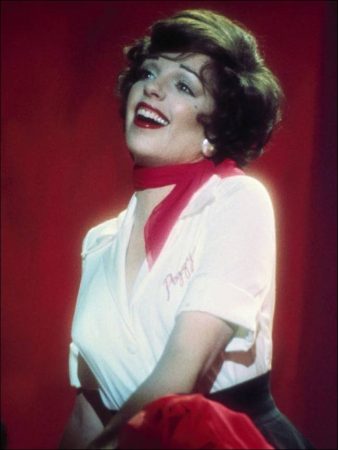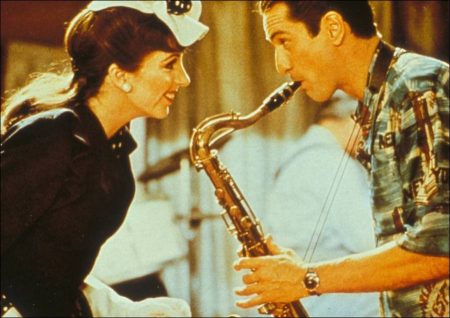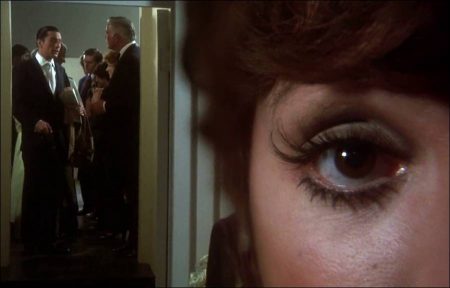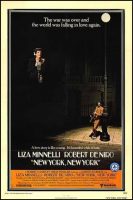Taglines: The war was over and the world was falling in love again.
New York, New York movie storyline. Set primarily in post-WWII New York City, Martin Scorsese’s extravagant romantic musical is about a jazz saxophonist and a pop singer who fall madly in love and marry. But the saxophonist’s outrageously volatile personality places a continual strain on their relationship, and after they have a baby, their marriage crumbles.
New York, New York is a 1977 American musical drama film directed by Martin Scorsese and written by Mardik Martin and Earl Mac Rauch based on a story by Rauch. It is a musical tribute, featuring new songs by John Kander and Fred Ebb as well as jazz standards, to Scorsese’s home town of New York City, and stars Robert De Niro and Liza Minnelli as a pair of musicians and lovers.
The story is “about a jazz saxophonist (De Niro) and a pop singer (Minnelli) who fall madly in love and marry;” however, the “saxophonist’s outrageously volatile personality places a continual strain on their relationship, and after they have a baby, their marriage crumbles,” even as their careers develop on separate paths. The film marked the final screen appearance of actor Jack Haley.
About the Story
On V-J Day in 1945, a massive celebration in a New York City nightclub is underway, music provided by the Tommy Dorsey Orchestra. While there, selfish and smooth-talking saxophone player Jimmy Doyle (De Niro) meets small-time USO singer Francine Evans (Minnelli), who, although lonely, still wants nothing to do with Jimmy, who keeps pestering her for her phone number.
The next morning, they end up sharing a cab, and, against her will, Francine accompanies Jimmy to an audition. There he gets into an argument with the club owner. Francine, to get the audition back on track, begins to sing the old standard, “You Brought a New Kind of Love to Me”; Jimmy joins in on his sax.
The club owner is impressed and, to Francine’s astonishment, they are both offered a job—as a boy-girl act. From that moment on, Jimmy and Francine’s relationship deepens into a mix of obsession and love. But there are problems—mainly, Jimmy’s tendency to fight with his co-workers, and his increasingly violent arguments with Francine, who becomes pregnant with his child. An especially bad shouting match between them results in Francine going into labor. Jimmy rushes her to the hospital, where she delivers a baby boy. But Jimmy is not ready to be a father, or a good husband, and he abandons his wife, declining even to see his newborn son as he leaves the hospital.

Several years later, in a recording studio, Francine records “But the World Goes Round,” a powerful anthem which makes the charts and turns her into a popular entertainment figure. In the years that follow, Jimmy and Francine both find success in the music industry; he becomes a renowned jazz musician and club owner, while she becomes a successful singer and film actress.
Jimmy records a song of his on his saxophone which tops the jazz charts, and Francine cements her stardom after singing that same song, “New York, New York,” for which she has provided the lyrics. Her performance, received by a wildly appreciative audience, takes place in the same nightclub where, years earlier, she and Jimmy had met. After the show, Jimmy telephones his ex-wife, suggesting they get together for dinner. Francine is tempted, heads toward the stage door exit, but at the last moment changes her mind. Jimmy, waiting on the sidewalk, realizes he has been stood up and heads off down the street, accompanied by the song he has written—the “Theme from New York, New York”.
New York, New York (1977)
Directed by: Martin Scorsese
Starring: Liza Minnelli, Robert De Niro, Lionel Stander, Barry Primus, Mary Kay Place, Georgie Auld, Dick Miller, Kathi McGinnis, Clarence Clemons, Adam David Winkler, Dimitri Logothetis
Screenplay by: Mardik Martin, Earl Mac Rauch
Production Design by: Boris Leven
Cinematography by: László Kovács
Film Editing by: Bert Lovitt, David Ramirez, Tom Rolf
Costume Design by: Theadora Van Runkle
Set Decoration by: Robert De Vestel, Ruby R. Levitt
Art Direction by: Harry Kemm
Music by: John Kander, Fred Ebb
MPAA Rating: None.
Distributed by: United Artists
Release Date: June 21, 1977
Visits: 84


